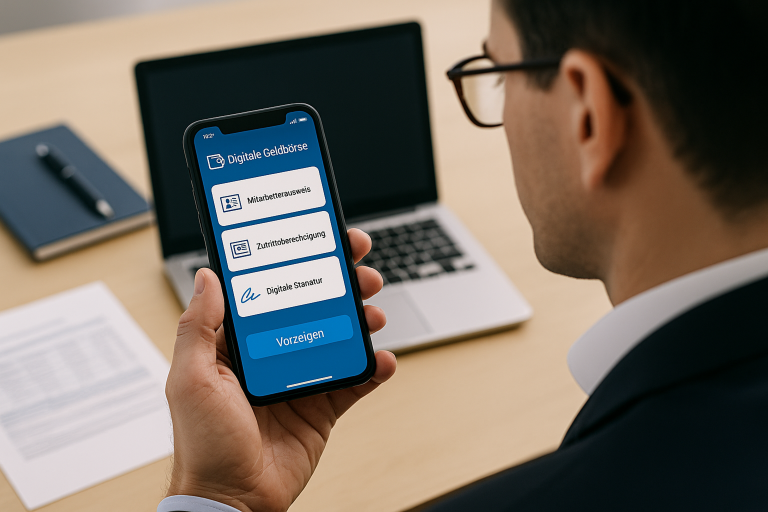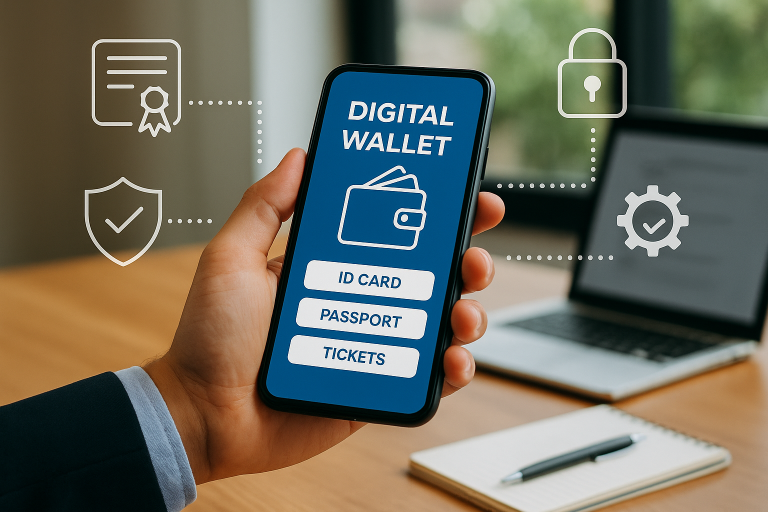
The Digital Wallet – widely known from personal use – is gaining increasing importance for businesses and public institutions. But what does the use of a digital wallet actually mean in a B2B context? And how can companies strategically leverage this technology? In this article, we highlight practical use cases, key success factors, and real-world examples from the business landscape.
What is a Digital Wallet in the B2B Context?
A digital wallet serves as a digital storage space for identity credentials, permissions, certificates, and other digital assets. In the B2B sector, it can be used for:
- Digital employee IDs
- Access permissions to internal systems
- Electronic seals for organizations
- Proof of training or certifications
- Digital signatures (QES)
In this context, it’s not just about ease of use—trust, interoperability, and legal compliance are key, especially in light of eIDAS 2.0 and the planned EUDI Wallet (expected to launch in mid-2026).

Strategic Value for Companies
Implementing a digital wallet is far more than a technical project—it’s a strategic move toward greater efficiency, security, and future readiness. When used effectively, a digital wallet doesn’t just digitize existing business processes—it significantly enhances them. Companies benefit on multiple levels:
Increased Efficiency
Digital credentials that can be issued and managed directly via the wallet reduce manual steps and eliminate media discontinuities. Whether during digital onboarding of new employees, swift verification of certifications, or contract execution, the wallet enables seamless, end-to-end digital processing. This not only saves time but also minimizes errors and relieves internal teams. Processes that once took days or weeks can now be completed within minutes using wallet-based identity verification.
Enhanced Security
The digital wallet allows for highly secure, encrypted storage and use of sensitive data. Users retain control over their identity credentials and decide when and with whom they share specific information. Strong authentication methods—such as biometric verification or integration with national eIDs—help prevent misuse and identity theft. This is a major advantage in the B2B environment, where legally binding digital interactions are essential.
Trustworthiness
Trust in the identities of individuals and organizations is central to any digital transaction. By connecting to qualified trust services—such as digital seals or qualified electronic signatures (QES)—companies can ensure their processes meet the highest legal standards. This is especially important in regulated industries or in cross-border business, where compliance and legal validity are critical. The digital wallet thus becomes a reliable tool for building trust—both internally and externally.
Scalability
Another strategic advantage lies in the wallet technology’s high degree of integration. Standardized interfaces (APIs) allow for seamless embedding into existing enterprise systems such as ERP, HR, or CRM solutions. Companies can begin with a clearly defined use case and gradually expand wallet usage. This enables scalable adoption without overhauling existing IT infrastructure—reducing complexity and increasing investment security.

Success Strategies for Implementation
Introducing a digital wallet in a company is a transformational project—and as with any strategic change, its success depends heavily on thoughtful planning, choosing the right partners, and actively involving employees. To ensure that the digital wallet not only works technically but also delivers real added value, companies should follow these key success strategies:
Prioritize Use Cases
Entering the world of digital wallets shouldn’t start with too many moving parts. Instead, it’s advisable to begin with one or two economically relevant use cases where the benefits are clearly measurable. Digital signature processes, access and permission management, or entry control systems often make ideal pilot applications. These use cases deliver quick wins, which foster internal acceptance and pave the way for further expansion.
Engage the Right Partners
Successfully implementing a wallet strategy requires expertise across multiple domains—from legal frameworks and technical interfaces to user experience. Companies should therefore rely on experienced and certified Trust Service Providers (TSPs) who are familiar with regulatory requirements (e.g., eIDAS 2.0) and offer proven integration solutions. For instance, SIGN8 supports companies not only with the technical implementation but also ensures full compliance with security and legal standards.
Create Internal Buy-in
Technology only proves its worth when people use it. For a digital wallet to be adopted in everyday work, companies need clear communication, user-friendly instructions, and practical training. Employees must understand the wallet’s benefits for their daily tasks—whether it’s saving time, gaining more autonomy, or eliminating cumbersome approval processes. Early involvement of key stakeholders and internal advocates can further boost acceptance.
Think Long-Term and Future-Proof
In a rapidly evolving landscape like digital identity, foresight is crucial. Companies should choose wallet solutions based on open standards and interoperability—such as EUDI compatibility, modular architectures, or standardized APIs. This ensures the solution can adapt to new requirements, regulatory changes, or international developments without the need for costly redevelopment.

Practical Examples: How Companies Are Successfully Using the Digital Wallet
The potential of the digital wallet becomes particularly clear when examining concrete use cases from corporate practice. Below, we present three scenarios where wallet solutions are already creating tangible value today – from signatures and access control to compliance.
Digital Signatures for Contract Execution
A medium-sized technology company previously managed contract creation and approval through a traditional email-based workflow – involving manual signatures, media disruptions, and long processing times. By introducing a wallet-based signature solution, employees can now issue qualified electronic signatures (QES) directly via their digital wallet. Identification is performed once through VideoIdent, and the subsequent signature is done via app with two-factor authentication. The result: the entire contract process was not only legally digitized but also shortened from an average of five days to less than one hour.
Access Control in Distributed Work Environments
An international consulting firm with multiple locations uses the digital wallet to manage digital employee IDs and access permissions. As part of their digital onboarding process, new employees automatically receive the necessary credentials in their wallet – including a digital ID, access rights to sensitive systems, and entry to specific buildings. Changes in roles or responsibilities can be centrally managed and updated in real time. This not only reduces administrative effort but also increases security by automatically revoking outdated permissions.
Proof of Compliance in Regulated Industries
A company in the energy sector must regularly prove that certain employees have completed specific training or certifications – for example, in occupational safety or environmental law. Instead of relying on paper certificates or central Excel lists, the company uses the digital wallet: certificates and authorizations are stored directly in the wallet and can be reliably presented when needed – such as during audits or inspections by authorities. The wallet thus serves as a trustworthy, up-to-date, and always-accessible container for proof. This not only simplifies compliance but also creates transparency and traceability throughout the organization.
Conclusion
The digital wallet is far more than just a technical add-on. It is becoming a strategic tool for companies that want to use digital identities securely, efficiently, and in a user-friendly manner. Those who invest early and rely on established standards gain clear competitive advantages – and are well prepared for an eIDAS-compliant future of digital identities.
Would you like to learn more about digital wallets? Then book your demo now under Contact Us – E-Signatures by SIGN8 or send us a message at customerservice@sign8.eu.
